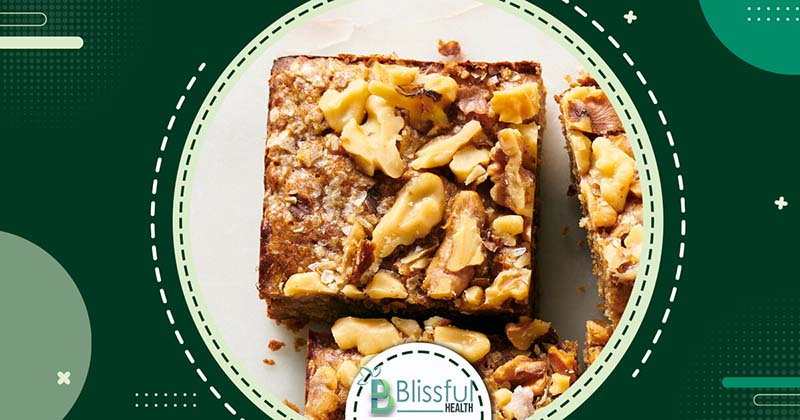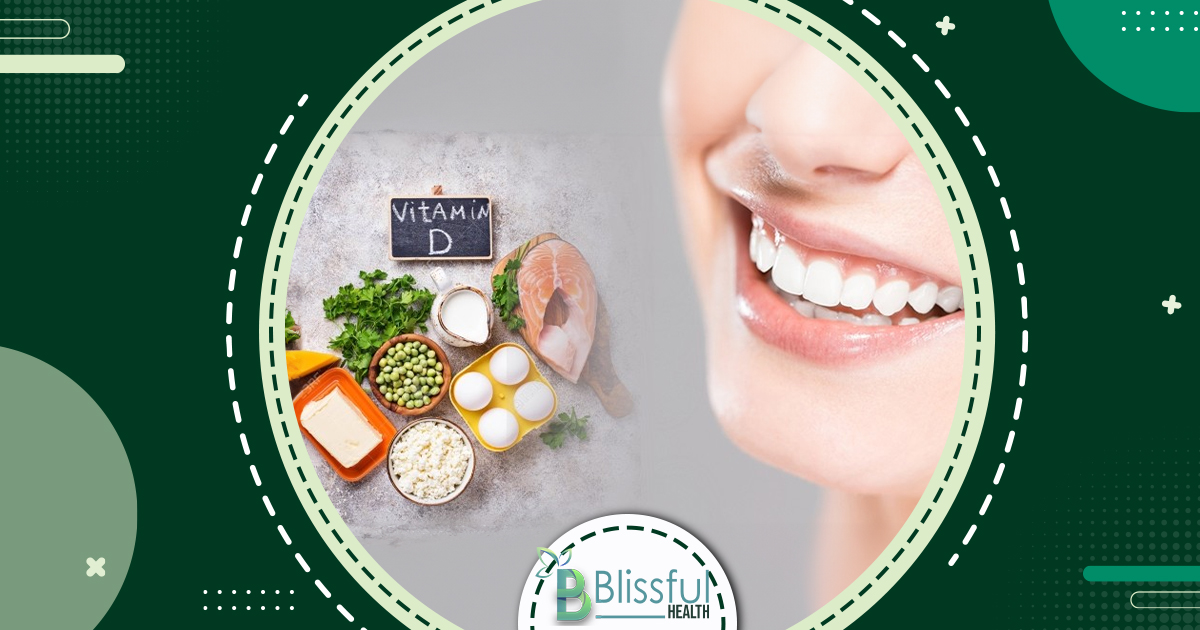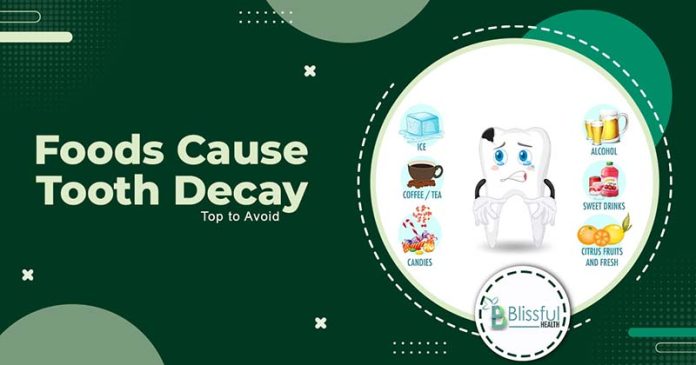Tooth decay and enamel erosion are significant oral health concerns, with the potential to lead to more serious problems and require a variety of treatments, including fluoride, fillings, and dental crowns. Ignoring these early signs of tooth decay can worsen oral health conditions.
However, taking preventative measures can stop or even reverse the progression of tooth decay. This article delves into the list of foods that cause tooth decay, looking at the most effective treatments available for these common dental problems.
Join Blissfulhealth as we explore how to protect your oral health from cavities. Let’s gain a deeper understanding of this common oral health challenge.
What Is the Cause of Tooth Decay?
Explore the key factors that lead to tooth decay, from what you eat to how you care for your teeth.
Sweet Treats
Before grabbing that sugary snack, consider its impact on your dental health. Numerous studies indicate that frequent consumption of sweets and sugary drinks is strongly associated with the development of cavities.
Regular snacking on sugary foods prolongs the exposure of your teeth to acids, accelerating tooth decay. A recent study involving school children revealed that those who snacked on cookies were four times more likely to develop cavities compared to children who avoided such snacks.

Acidic Eats
Foods and beverages high in acidity, such as citric fruits or alcohol, can interact with oral bacteria and corrode tooth enamel. Consumption of these items, especially coupled with inadequate oral hygiene practices, can contribute to tooth decay. Many people overlook the role of acidic foods in enamel erosion.
Carb Snacks
Carbohydrates in the mouth stimulate bacteria to produce acid, which can harm tooth enamel. Enamel serves as a protective barrier against cavities. When this enamel is compromised and worn down, the presence of carbohydrates can accelerate tooth decay.
List of Causes of Tooth Decay: 10 Lesser-known Sugary Foods
Uncover the unexpected sugary culprits in your diet that contribute to tooth decay.
Breakfast Bars
Breakfast bars, often chosen for their convenience or as a quick snack, are frequently loaded with added sugars. Many varieties contain dried fruits with additional sweeteners, contributing to tooth decay. Remember to brush your teeth after indulging in these treats.

Flavoured Yogurt
Yogurt, a popular breakfast option, can harbor significant amounts of sugar, especially fruit-flavored varieties like strawberry. Opting for plain Greek yogurt can help reduce sugar intake.
Dressing for Salads
While salads are often perceived as a healthy choice, certain salad dressings, such as honey mustard and balsamic vinaigrette, can pack a surprising amount of sugar. Be mindful of the sugar content in dressings, which can also be high in calories.
Fruits in Syrup
Canned fruits packed in syrup contain unhealthy levels of added sugar, which can contribute to tooth decay and other health issues, particularly if consumed frequently and in large quantities.

Prepared Salads
Even seemingly healthy options like lean chicken and side salads can hide sources of sugar. Coleslaw and salads with dried fruits and nuts are common culprits, along with excess calories.
Dried Fruit
Dried fruits, while perceived as a healthy snack, are concentrated sources of sugar compared to their fresh counterparts. Consuming large amounts of dried fruits can significantly elevate sugar intake.
Nuts with a Twist
Nuts, often regarded as a protein and fat source, may contain added sugars in roasted or flavored varieties. Watch out for sweet chili or other seasoned nuts, which can contribute to sugar consumption.
Sauces
Pre-made sauces for pasta or curry often contain added sugars for flavor enhancement. Consider preparing homemade sauces without added sugar and freezing batches for future use.
Spreads and Toppings
Condiments like ketchup, mayonnaise, and mustard commonly contain added sugars. Look for sugar-free alternatives or experiment with homemade versions to control sugar intake.
Sweetened Oatmeal
While oatmeal itself may not directly impact oral health, sweetened varieties like those made with oat milk can contribute to tooth decay indirectly. Phytic acid content in oatmeal influences the risk of cavities, emphasizing the importance of moderation.
List of Causes of Tooth Decay: 10 Acidic Foods to Watch Out For
Explore the acidic foods that can lead to tooth decay, and how to manage their impact on your dental health.
Oranges and Lemons
While rich in vitamin C and antioxidants, citrus fruits like oranges and lemons are highly acidic, which can erode tooth enamel. Limit consumption to protect your teeth, as once enamel is lost, it cannot be restored. Citrus juices, with their combination of citric acid and sugar, pose an even greater risk for dental decay.

Ready-to-eat Meats
Processed or cured meats have elevated acid levels compared to freshly cooked varieties. Tough cured meats like chorizo can also get stuck between teeth, increasing the risk of acid exposure.
Eggs
Eggs contain phosphorus, a substance that promotes acid production, making them a food to avoid for those concerned about tooth decay. Eggs are often added to sugary foods like cakes and biscuits, further increasing the risk.

Meat
Fresh red meat and lean poultry contain significant levels of acid, with red meats also being higher in fat and prone to getting trapped between teeth, exacerbating acid exposure.
Milk and Cheese
While dairy products like yogurt and certain cheeses add acidity due to lactic acid from fermentation, individuals with sensitivities may opt for low-acid options such as low-fat or non-fat milk. Dairy alternatives like almond or oat milk offer lower acidity for those seeking non-dairy options.
Tomatoes
Tomatoes, regardless of their form, contain acid that can contribute to tooth decay with frequent consumption. Tomato-based products like sauces may also contain added sugars, compounding the risk.
Pickles
While cucumbers themselves pose no threat to teeth, pickles made with vinegar can erode enamel. Research indicates that consuming pickles more than once a day significantly increases the likelihood of enamel erosion.
Plain Bread
Despite seeming innocuous, bread contains starch that converts to sugar in the mouth, fostering plaque buildup and tooth decay, especially if it gets stuck between teeth.
Salt
Adding salt to foods can increase mouth acidity, which may contribute to tooth decay if used excessively. Cooking with salt rather than adding it to prepared foods can help mitigate this risk.
Fizzy Drinks
Carbonated soft drinks are a leading cause of tooth decay due to their combination of carbonation, sugar, and acids. These ingredients weaken tooth enamel and promote bacterial growth, fostering dental decay.
Tips for Eating Foods That Are the Main Cause of Tooth Decay
Learn how to enjoy foods while protecting your teeth from decay with these practical tips.
Brush or Clean Between Teeth After Meals
Maintain good oral hygiene by brushing and flossing after eating to reduce bacterial plaque buildup that harms teeth. However, after consuming acidic foods and drinks, wait about half an hour before brushing to prevent enamel erosion.

Add More Base Foods to Your Meals
Incorporate natural and minimally processed acidic foods like beans, lentils, and milk into your diet, as they offer essential nutrients. Avoid processed foods such as refined sugar, sauces, and white flour.
An alkaline-rich diet, comprising fruits, vegetables, and natural foods, supports overall health by providing vitamins, minerals, and antioxidants. This helps regulate metabolic pH, strengthening the immune system and potentially preventing conditions like diabetes, osteoporosis, and obesity.
Choose Foods Full of Calcium.
While some calcium-rich foods contain acid, such as dairy, nuts, and seeds, they can still contribute to stronger teeth and bones. Consider incorporating non-acidic calcium sources like kale into your diet, or supplement with calcium to support dental and skeletal health.
Conclusion We trust you found our overview of the list of foods that cause tooth decay informative, shedding light on some unexpected culprits. While there are numerous lesser-known sugary, starchy, and acidic foods that may promote tooth decay, awareness and good oral hygiene practices can help mitigate their effects.
If tooth decay does occur, a diligent hygiene routine can often reverse early-stage decay. However, if decay has advanced to the point of complications like cavities or gum disease, rest assured that treatment options are available, typically in a safe and painless manner.
Conclusion
We trust you found our overview of the list of foods that cause tooth decay informative, shedding light on some unexpected culprits. While there are numerous lesser-known sugary, starchy, and acidic foods that may promote tooth decay, awareness and good oral hygiene practices can help mitigate their effects.
If tooth decay does occur, a diligent hygiene routine can often reverse early-stage decay. However, if decay has advanced to the point of complications like cavities or gum disease, rest assured that treatment options are available, typically in a safe and painless manner.


